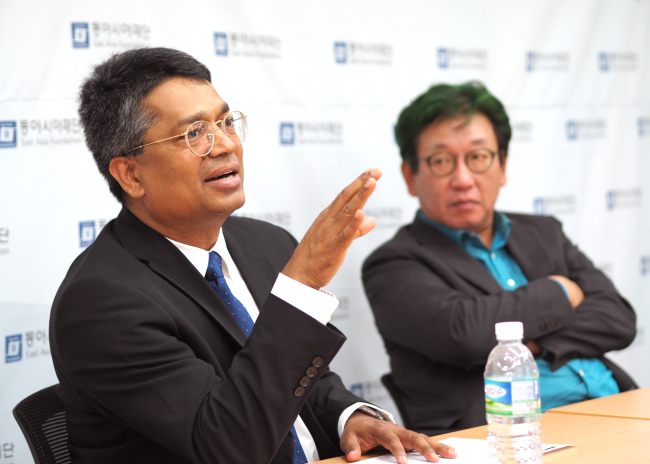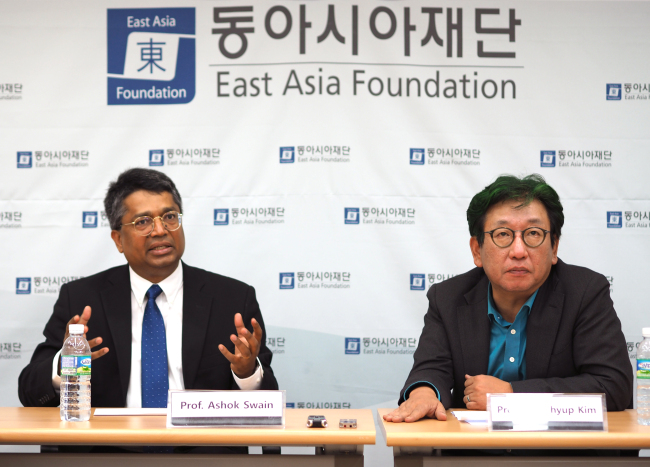With the rising tide of global warming creating greater uncertainties over our water management, developed and developing countries should come together to prevent the tragedy of the commons and search for sustainable solutions affecting their common future, according to a renowned academic expert on the issue.
“The problems are manifold, but fundamentally speaking we are not using water the way we should be,” said professor Ashok Swain of Uppsala University in Sweden in an interview with The Korea Herald in Seoul on June 29.
“We have to cut down our demand. But most countries are not taking that step. Water is a finite resource and we cannot go about our business as usual. The problem lies in our understanding of how to manage water.”
Many powerful countries like the US, China and India -- the so-called “hydro hegemons” -- exploit their power and upstream locations to use water disproportionately and sow instability in regional politics to their advantage, he said, calling it “a very selfish and nearsighted approach.”
Swain is the director of the Centre for International Water Cooperation and Department of Peace and Conflict Research at the university. He spoke at a seminar organized by the East Asia Foundation in Seoul before the interview.
“The problems are manifold, but fundamentally speaking we are not using water the way we should be,” said professor Ashok Swain of Uppsala University in Sweden in an interview with The Korea Herald in Seoul on June 29.
“We have to cut down our demand. But most countries are not taking that step. Water is a finite resource and we cannot go about our business as usual. The problem lies in our understanding of how to manage water.”
Many powerful countries like the US, China and India -- the so-called “hydro hegemons” -- exploit their power and upstream locations to use water disproportionately and sow instability in regional politics to their advantage, he said, calling it “a very selfish and nearsighted approach.”
Swain is the director of the Centre for International Water Cooperation and Department of Peace and Conflict Research at the university. He spoke at a seminar organized by the East Asia Foundation in Seoul before the interview.

The hard facts are that 1.1 billion people around the world live without access to clean drinkable water; 2.6 billion people lack adequate sanitation; and 5 million people, including 1.8 children, die every year from water-related diseases.
Exacerbated by global warming, there is physical and economic water scarcity encompassing uneven availability between and within regions and disparities in economic, institutional and technological capacities to deal with water-related problems. Water pollution from industrial growth and mistreated waste is another key malaise.
“It’s going against sustainable development. That’s the problem,” Swain stressed.
According to the scholar, climate change presents challenges as well as opportunities, as melting polar ice caps and rising precipitation have presented hydropower as a new source of renewable energy, but have also increased the unpredictable capacity of existing dams to deal with spillovers and rapidly changing water flows.
Global warming has destroyed many hydropower projects, and raised incidents of severe flood and glacier lake outbursts. Planning water development projects has consequentially become more difficult, he noted, adding existing water-sharing arrangements are under threat. Rivers’ roles as national boundaries have also been jeopardized.
Whereas in the past dam-building was frequently annulled or resisted for its ecological destruction and aggravation of the livelihood of residents nearby, it now has gained the moral legitimacy of contributing to climate mitigation and helping reach the cap on carbon emissions.

At the same time, many upstream countries have resorted to realpolitik to gain an upper hand in regional power struggles. The increasing construction of dams -- which are easier in “less democratic states” -- has added to the suffering of livelihood and ecology in adjacent areas and caused much social unrest.
To alleviate the current deadlock, the academic urged upstream countries to share their water fairly and sustainably. Unlike in climate mitigation, where a country’s contribution shows no immediate benefit, doing so brings direct positive effects on the lower riparian countries, Swain said.
It is also critical to create water-specific legal and institutional frameworks to enforce adherence to principles, the professor advised. The first step would be creating a river basin-based or basin-specific agreement, as water-sharing accords have generally been successful and resilient over time, even between hostile parties.
Acknowledging that each region has its own set of issues, he said, “We cannot superimpose what works on the Rhine or Colorado rivers to the Euphrates River. Nevertheless, a global principle will help. You need both a larger framework as well as case-specific remedies and arrangements.”

He added, “You certainly need to bring few key countries on board like America, China, India, Egypt and Turkey. If they can come together and agree on a set of principles, the whole lot will improve.”
China, which has increasingly become a resource leviathan, has not signed any water-sharing agreement, he said. “It’s a strategic ambiguity. But China also knows very well it has to keep a working relationship with neighboring countries.”
As a positive example, Swain highlighted the cooperation in the Baltic Sea, where advanced industrialized countries like Germany, Denmark, Finland, Sweden and Norway have poured significant resources to clean the sea since the early 1990s. The Baltic Sea had been polluted from contaminants flowing from Russia and former Soviet Republic countries.
“Those with capital and technology should lead the effort in water purification and reuse,” he said, adding that industrialized economies possess the necessary technologies, but are hesitant to share them.
Swain also pinned his hope on the next generation of diplomats, whom he viewed as more regionally and globally minded, as opposed to being tunnel-visioned by national interests.
“The new generation of diplomats, particularly those that began their careers since the early 2000s, tend to look at issues more openly compared to their predecessors, whose minds were molded during the Cold War era,” the academic argued.
“We are more interdependent than ever, and recognition of this is critical. Also, when they are not experts on issues, they need to draw on the specialty of scientists and scholars. There is progress in the right direction, albeit at a pace too slow.”
By Joel Lee (joel@heraldcorp.com)









![[Kim Seong-kon] Democracy and the future of South Korea](http://res.heraldm.com/phpwas/restmb_idxmake.php?idx=644&simg=/content/image/2024/04/16/20240416050802_0.jpg&u=)







![[KH Explains] Hyundai's full hybrid edge to pay off amid slow transition to pure EVs](http://res.heraldm.com/phpwas/restmb_idxmake.php?idx=652&simg=/content/image/2024/04/18/20240418050645_0.jpg&u=20240418181020)

![[Today’s K-pop] Zico drops snippet of collaboration with Jennie](http://res.heraldm.com/phpwas/restmb_idxmake.php?idx=642&simg=/content/image/2024/04/18/20240418050702_0.jpg&u=)